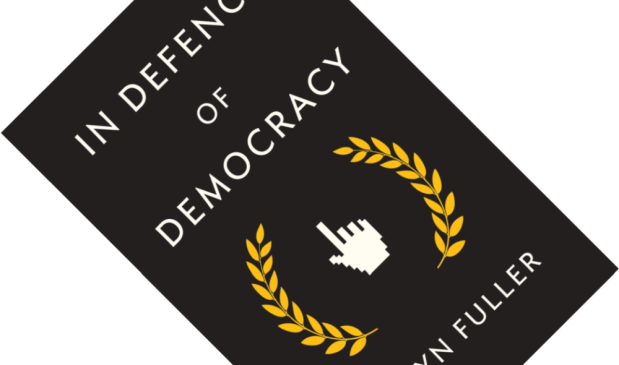9-minute read
This review is one half of a two-parter. Not long after posting my review of Can Democracy Work? I received an email from Dr Roslyn Fuller: since I had mentioned her book In Defence of Democracy, would I be interested in reviewing it? This seemed like a great opportunity to also finally read Against Democracy, which has been sitting on my shelves for a while now. Two books, two opposing viewpoints, two reviews, back-to-back.

In Defence of Democracy, written by Roslyn Fuller, published by Polity in November 2019 (paperback, 216 pages)
Fuller is the director of the Solonian Democracy Institute which researches alternative democratic practices. She is particularly fascinated by Athenian democracy, the subject of her previous book Beasts and Gods, which provides valuable background reading. That book attacked current democracy, judging it to be more akin to an oligarchy, a rule of the few. So you might be confused that her next book is called In Defence of Democracy. However, Fuller is not opposed to democracy per se. In the face of a spate of recent anti-democracy books, she feels it is high time someone took a stand.
Fuller’s anti-anti-democracy arguments and solution
In Defence of Democracy is about two-thirds critique of anti-democrats, and one-third proposal for a “world you might actually want to live in“. She singles out a small group of popular books that, together with the astonishment over the Brexit referendum and the election of Donald Trump, have fed the narrative that dumb voters make democracy a disaster. Next to Brennan’s Against Democracy, she takes aim at Caplan’s The Myth of the Rational Voter, Achen & Bartels’s Democracy for Realists, Somin’s Democracy and Political Ignorance, and Bell’s The China Model. And, oh my, she does not mince her words.
Thus, she disarms the idea that voters would be too sexist (see Democracy for Realists) or racist (as often argued regarding the Brexit referendum). Though both affect politics, they are nothing new and nothing unique to democracy, writes Fuller. She is similarly critical of the idea that people do not know what is good for them as they do not bother to learn about politics (she calls it futility-induced ignorance, see The Myth of the Rational Voter). Or that people are just too irrational, changing their mind because of arbitrary and uncontrollable events. One spurious example she takes to court is the supposed link between shark attacks and electoral outcomes (see Democracy for Realists).
Particularly relevant to this two-part review is the argument that people are just too ignorant. She calls this obsession with people’s inability to do cold recall of political factoids “a stock trope of hyperventilating newspaper articles and panicking academics […] greeted among anti-democrats with a kind of gleeful shock horror: Look how dumb everyone is!“. Humans are quite capable of dealing with problems without completely understanding them, e.g. driving a car without being a mechanic. And (a convincing argument) humanity functions more like a hive mind when it comes to knowledge: dumb individually, but smart collectively.
“Fuller rubbishes anti-democracy arguments, but more than offering fire and fury, she has solutions of her own. Since the problem lies with the system rather than the people, we need to change the system.”
Not content to rubbish anti-democracy arguments, she then turns to the proposed solutions of these authors. One solution that receives particular attention, as it returns later in the book when discussing Athenian practices, is that of sortition. In essence, this is the use of a lottery to randomly select citizens to make up a decision-making body that could offer advice on legislation or policy, or exercise veto rights – there are different variations on this theme. One of the flaws of ideas put forward by e.g. Against Elections, says Fuller, is that the proposed bodies are far too small. This risks corruption, poor representativeness, and having one’s views “massaged” by expert panels. The Athenians did this rather differently and Fuller goes to quite some length to explain how and why this matters.
As for the other solutions, whether it would be rule by the knowledgeable, the deep state, the market, or the superior: after walking the reader through them, she concludes that the idea of the masses handing over their voting rights to a tiny minority is nothing more than thinly-veiled totalitarianism. History shows what happens when we take away rights from people “for their own good”. And she does not stop there. Her conclusion warns the reader not to fall for “a grasping, sorry, desperate fraud, offering nothing but hysteria and oppression. A narcissistic doctrine hidden behind a veneer of pompous righteousness“. It is a take-down that is as glorious as it is furious, and it certainly made me chuckle.
More than offering fire and fury, Fuller has solutions of her own. Since the problem lies with the system rather than the people, we need to change the system to incentivize people to (want to) behave differently. Inspired by the practices in ancient Athens she lays out five major principles. These are: – mass participation through online platforms (already practised in places), – paying people for participation (both as motivation and reward for the effort and time involved), – focused and outcome-oriented deliberation (to counteract the negative excesses that characterise online debate), – informal and precarious leadership (to avoid the misuse and corruption that characterise stable leadership), – and sortition done the right way. She concludes by showing how the great unwashed masses want to participate, and how her proposal addresses some of the problems the anti-democrats have with democracy.
Concerns and doubts regarding Fuller’s solution
Although Fuller has thought about her solutions more thoroughly than Brennan has in Against Democracy, I still have some nagging doubts and worries. One observation is that Athenian democracy was not all that inclusive, purposefully limiting it to male citizens. Women and slaves were excluded. Could part of the reason that Athenian democracy worked so well be that you had a rather homogenous group? Would mass participation break down with more diverse participants with opposing viewpoints? Brennan warns of polarisation of debates.
Furthermore, online debating has a bad reputation – deservedly so, I think. Both Fuller here, and Sunstein in #Republic, propose changes to make the internet a more democracy-friendly place. But even if people need to use their real name, they behave differently online than face-to-face, presenting a marked break from Athenian practices. Also, how would this online mass-participation scale up from the relatively small-scale platforms that currently exist? You cannot keep on top of people’s comments and input when the number of contributors runs in the millions.
My biggest concern, however, or perhaps it is my shortcoming, is that I do not have as much faith in my fellow citizens as Fuller does. Though she seems to take umbrage with people who have argued this, I think that the Brexit vote was an appalling example of democracy gone awry. Admittedly, I was as much galled by the campaign’s anti-immigrant undertones and utter lack of prospects (what is actually going to happen if we vote to leave?), as I was with the fact that the majority of voters fell for it hook, line, and sinker.
“[…] humans are notoriously vulnerable to psychological biases, superstitions, conspiracy theories, irrational behaviour, and plain dumbfuckery. […] Simply put, some things are just not up for a vote.”
Part of the reason I find Brennan’s knowledge argument so appealing is that humans are notoriously vulnerable to psychological biases, superstitions, conspiracy theories, irrational behaviour, and plain dumbfuckery (see a further reading list below). Regular readers of this blog will know that I can get rather fired up about this in the context of science. Particularly relevant are my reviews of Anti-Science and the Assault on Democracy and The Misinformation Age which question the compatibility of science and democracy.
Simply put, some things are just not up for a vote. Take public health. If a majority thinks we should offer cancer patients the option of homeopathic treatments or abandon vaccinations over (discredited) links to autism, are we just going to let this slide because it is “the will of the people”? There are plenty of other areas where science and politics intersect and misinformation is rife (e.g. climate change or biotechnology such as genetic modification). Knowledge and expertise have their place, and even Fuller has to concede this point when she suggests on page 185 the “requirement that someone who wants to speak about a technical topic has formal qualifications in that area“. I think Brennan’s point is that this applies to many topics. Probably, she will respond that to go from here to taking away voting rights is an almighty leap. Still, to me it shows that he has laid his finger on a painful point that cannot simply be discarded out of hand either.
Conclusion: against or in defence of democracy?
Having now read both books, how do they compare? Fuller’s is certainly the easier read of the two and written with flair and gusto. Ironically, Fuller and Brennan have one thing in common: they both agree that democracy, as it is currently practised, is broken. But they diverge as to the problem and the solution. Brennan argues people are the problem, and a rule of the knowledgeable the answer. Fuller argues the system is the problem, and mass-participation the answer. It reminds me a bit of the parable of the Blind Men and the Elephant, where each blind man touches a different part of the elephant and gives a different description of it. Democracy obviously being the elephant here.
On balance, I lean more towards Fuller’s ideas, though a hybrid approach might well be needed. I do think voter ignorance is a huge problem, but, compared to the other problems Fuller highlights in Beasts and Gods, not to the extent that Brennan makes it out to be. I will agree with Brennan’s point that we should not be shy about picking whatever works best (in turn opening a whole new can of worms about metrics for this, which is another topic).
Reviewing Against Democracy and In Defence of Democracy back-to-back was an intellectually stimulating and surprisingly fun exercise. It was both interesting and mildly disconcerting to observe my own opinion on the topic swaying first in one and then another direction. This goes to show that on a topic where there are no absolutes it is a worthwhile exercise to seek out contrasting viewpoints, so I recommend both books.
Disclosure: The author provided a review copy of this book. The opinion expressed here is my own, however.

, hardback or ebook
Other recommended books mentioned in this review:
__________________________________________________________________
__________________________________________________________________
__________________________________________________________________
__________________________________________________________________

__________________________________________________________________
Some recent popular science books on psychological biases and such:
__________________________________________________________________





















4 comments